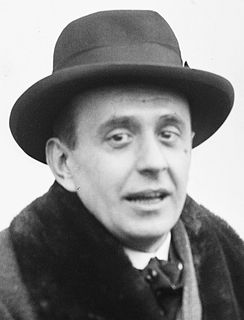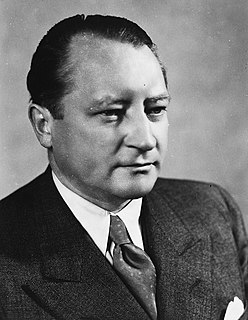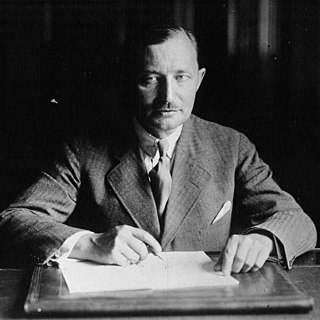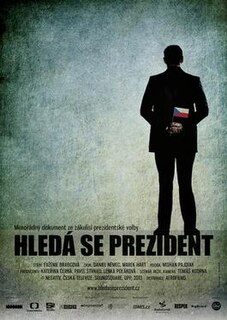| |||||||||||||||||
| |||||||||||||||||
| |||||||||||||||||
The 1948 Czechoslovak presidential election took place on 14 June 1948. Klement Gottwald was elected the first Communist president of Czechoslovakia. [1]
| |||||||||||||||||
| |||||||||||||||||
| |||||||||||||||||
The 1948 Czechoslovak presidential election took place on 14 June 1948. Klement Gottwald was elected the first Communist president of Czechoslovakia. [1]
The Communist Party of Czechoslovakia finished first in the 1946 parliamentary election and formed a new government with party leader Klement Gottwald as Prime Minister. The party used its influence to take over the country in a 1948 coup d'etat. [2] The incumbent president Edvard Beneš was unable to resist and resigned on 7 June 1948. [3] In accordance with the 1920 Constitution, Gottwald took over most presidential duties pending the election of a permanent successor.
When negotiations began, two candidates were proposed–Gottwald and Culture Minister Zdeněk Nejedlý. It was eventually decided that Gottwald would be nominated in order to legitimate the Communist regime. [4]

Klement Gottwald was a Czechoslovak communist politician, who was the leader of the Communist Party of Czechoslovakia from 1929 until his death in 1953–titled as General Secretary until 1945 and as Chairman from 1945 to 1953. He was the first leader of Communist Czechoslovakia from 1948 to 1953.

Jan Garrigue Masaryk was a Czechoslovak diplomat and politician who served as the Foreign Minister of Czechoslovakia from 1940 to 1948. American journalist John Gunther described Masaryk as "a brave, honest, turbulent, and impulsive man".

The Third Czechoslovak Republic which emerged as a sovereign state after the end of the war was not only the result of the policies of the victorious Western allies, the French Fourth Republic, the United Kingdom and the United States, but also an indication of the strength of the Czechoslovak ideal embodied in the First Czechoslovak Republic. However, at the conclusion of World War II, Czechoslovakia fell within the Soviet sphere of influence, and this circumstance dominated any plans or strategies for postwar reconstruction. Consequently, the political and economic organisation of Czechoslovakia became largely a matter of negotiations between Edvard Beneš and Communist Party of Czechoslovakia (KSČ) exiles living in Moscow.
With the collapse of the Habsburg monarchy at the end of World War I, the independent country of Czechoslovakia was formed as a result of the critical intervention of U.S. President Woodrow Wilson, among others.

Antonín Zápotocký was the communist Prime Minister of Czechoslovakia from 1948 to 1953 and President of Czechoslovakia from 1953 to 1957.

Ludvík Svoboda was a Czechoslovak general and politician. He fought in both World Wars, for which he was regarded as a national hero, and he later served as President of Czechoslovakia from 1968 to 1975.

Vladimír "Vlado" Clementis was a Slovak minister, politician, lawyer, publicist, literary critic, author and a prominent member of the Czechoslovak Communist Party. He married Lída Pátková, the daughter of a branch director of the Czech Mortgage Bank in Bratislava, in March 1933. He became a Communist MP in 1935. Before the beginning of World War II, in 1938, he emigrated to Paris. His criticism of the Molotov-Ribbentrop pact in 1939, contradicted the policies of the Czechoslovak Communist Party exiled to Moscow and triggered an intra-party investigation overseen by Viliam Široký.

In late February 1948, the Communist Party of Czechoslovakia, with Soviet backing, assumed undisputed control over the government of Czechoslovakia, marking the onset of four decades of communist rule in the country.

Zdeněk Fierlinger was a Czech diplomat and politician. He served as the Prime Minister of Czechoslovakia from 1944 to 1946, first in the London-based exiled government and later in liberated Czechoslovakia. His name is often associated with the merger of his Social Democratic Party with the Czechoslovak Communist Party after the communist coup in 1948. He was the uncle of Paul Fierlinger, the famous animator for numerous PBS cartoons.

Edvard Beneš, sometimes anglicised to Edward Benesh, was a Czech politician and statesman who was President of Czechoslovakia from 1935 to 1938 and again from 1945 to 1948. He also led the Czechoslovak government-in-exile 1939 to 1945, during World War II. As President, Beneš faced two major crises which both resulted in his resignation.

Parliamentary elections were held in Czechoslovakia on 30 May 1948. They were the first elections held under undisguised Communist rule; the Communist Party of Czechoslovakia (KSČ) had seized complete power three months earlier.

President Wanted is a 2013 Czech documentary film about the first direct presidential election in the Czech Republic. It was directed by Tomáš Kudrna.
The 1927 Czechoslovak presidential election took place on 27 May 1927. Tomáš Garrigue Masaryk was elected for his third term. His main rival was Communist Václav Šturc.
The 1934 Czechoslovak presidential election took place on 24 May 1934. Tomáš Garrigue Masaryk was elected for his fourth term.
The 1935 Czechoslovak presidential election took place on 18 December 1935. Edvard Beneš was elected the second President of Czechoslovakia and replaced Tomáš Garrigue Masaryk. Beneš's victory was considered unlikely due to lack of support in a parliament but negotiations helped him to win much larger support than Masaryk has ever received.
The 1946 Czechoslovak presidential election took place on 19 June 1946. It was first election since end of World War II. Edvard Beneš was elected for his second term.

The 1948 Czechoslovak presidential election took place on 14 June 1953. It was held due to the death of Klement Gottwald. Prime Minister Antonín Zápotocký was elected the new president.
The Košice Program was a 1945 agreement between Czechoslovak Communists who had spent the war in the Soviet Union and the Czechoslovak government-in-exile, which had been based in London. They met in the city of Košice, which had already been liberated by the Red Army. The program outlined the postwar political settlement, the National Front under which all political parties would operate, and promised the expulsion of Germans from Czechoslovakia. The program was the basis of both the Third Czechoslovak Republic and, following the 1948 coup, the Czechoslovak Socialist Republic.
Václav Nosek was a Czechoslovak Communist politician who served as Minister of the Interior from 4 April 1945 to 14 September 1953.